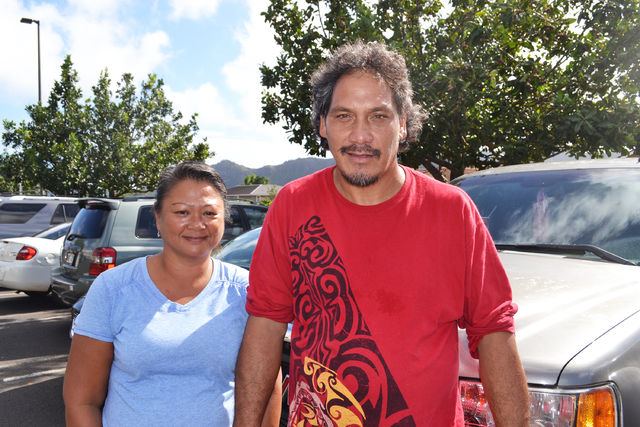LIHUE — Clity Shepard and Lono Aki have jobs, pay their bills and are happy. They also have been homeless for over a year. “I am tired of paying for somebody’s mortgage,” said Shepard, who lives with Aki in their
LIHUE — Clity Shepard and Lono Aki have jobs, pay their bills and are happy.
They also have been homeless for over a year.
“I am tired of paying for somebody’s mortgage,” said Shepard, who lives with Aki in their truck in the Lihue area. “We don’t mention to some people that we’re houseless because they have one idea of the homeless is and that’s the worst idea ever: that we’re on drugs, are criminals. Just because we’re homeless, it doesn’t mean we’re like that.”
Aki said he chooses to be homeless.
“I feel I’m paying for somebody else to get rich, when I can keep the money for myself,” he said, referring to paying a monthly rental fee. “It doesn’t make no sense. I feel we should all help each other.”
The Aloha State has among the largest increases in homeless people in the nation, according to a report released Thursday by the Department of Housing and Urban Development.
Hawaii saw a total of 7,921 homeless people in 2016, according to the 2016 annual Homeless Assessment Report to Congress. That figure is an increase of about 35 percent compared to the 2010 mark of about 6,000 people.
According to the annual Point in Time count released in June, there was 442 homeless people on Kauai in 2016, a 30 percent increase from last year’s figure of 339.
In Hawaii, Gov. David Ige’s administration has used money made available after Ige declared a state of emergency to accelerate the development of affordable housing and shelters. Honolulu banned sitting and lying down on sidewalks in parts of the city including the tourist hotspot Waikiki, and Hawaii is investing time to ensure that along with enforcing bans and developing housing, there are integrated services, said Scott Morishige, Ige’s homelessness coordinator.
“It’s not enough to just do enforcement actions on public lands without services to help people get connected to shelter or to longer term housing,” Morishige said. “You don’t want to just move people from one area to another.”
HUD’s report found that 549,928 people nationwide experienced homelessness on a single night in 2016, a decline of 14 percent since 2010.
High living expenses coupled with modest wages are a recipe for disaster, says Debra de Luis, secretary of Kauai Community Alliance which works to alleviate the homeless problem in Hawaii.
”When you put together the high cost of housing and just surviving in the economy with wages that are really modest in comparison to some other metropolitan kind of areas … it’s really hard for people,” she said.
de Luis said the island’s weather is among the reasons why homeless transplants are here.
“A small percentage of the homeless come from other locations, according to some studies we’ve looked at,” she said. “There’s a lot of confusion about that. We do have statistics from last year that about 10 percent of the homeless were from somewhere else.”
The majority of individuals who are homeless on the island are white males, she said. She also added that the majority of homeless are local families.
“The poverty level here on Kauai is 12 percent, rounding it up that’s a lot of people,” she said. “Maybe 8,000 in the community and most of those people are housed.”
Shepard and Aki said the scope of the culture toward homelessness has changed.
“When you didn’t have one house, people would welcome you in their house,” said Shepard, who works for the Regency at Puakea. “Now, it’s not like that. Now, it’s dog eat dog.”
Aki said the island should come together and fix the homeless problem.
“We need to resolve the problem; not make it worse,” said Aki, who works as a groundskeeper for the county.
Shepard, who aspires to own a house one day, said instead of paying for rent, their money goes for living expenses.
“It takes money to live on the street,” she said. “You gotta eat; you gotta have good health; you gotta do these things along the way that will cost money.
HUD estimates the nation experienced a 23 percent reduction among homeless families, a 47 percent drop in veteran homelessness, and a 27 percent decline in individuals experiencing chronic homelessness. This national estimate is based upon data reported by about 3,000 cities and counties across the nation.
HUD Secretary Julian Castro noted that though the nation is making progress in reducing homelessness, the number of “doubled up” or rent-burdened families remains a problem.
“Every person deserves a safe, stable place to call home,” said Secretary Castro.
•••
The Associated Press contributed to this report.


